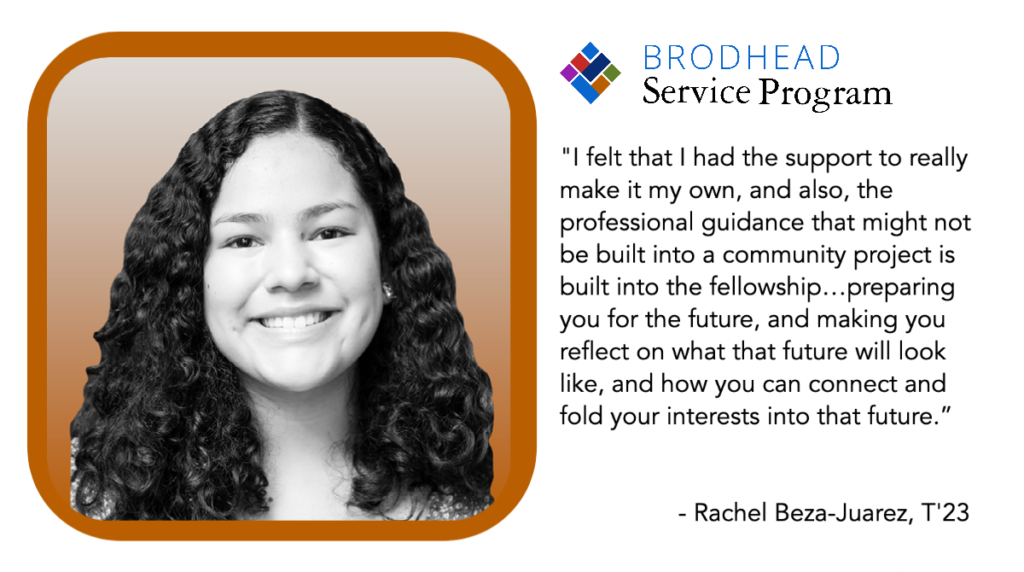DukeEngage is accepting applications for the Brodhead Service Program, a summer fellowship available to DukeEngage alumni who wish to design their own civic engagement project in partnership with an organization in the United States.
Interested? Read about the experiences of a recent Brodhead Fellow below. (Please note that while last summer’s fellowships were virtual, this year’s project proposals should plan on in-person fellowships.)

As a rising sophomore, Rachel Beza-Juarez was accepted to DukeEngage in Tucson for the summer of 2021, but after the program was canceled due to COVID-19, she was able to secure a virtual internship with Durham community organization Building from Below. Building from Below seeks to build self-reliant community institutions to create lasting social change.
During her internship, she worked with a team to translate and dub !Palante, Siempre Palente!, a documentary film about the Young Lords, a Puerto Rican and Latino activist group in the 1960s and 70s, for use as an educational resource for the Spanish-speaking community. She became interested in how community institutions can remove barriers to education and make learning more accessible.
Rachel decided to continue working with Building from Below for a second summer through the Brodhead Fellows Program. This time, she was able to work independently and design her own project, exploring her interests in health and education. Her goal was to create a curriculum on health for a K-12 audience in eight weeks.
After “about two weeks,” Rachel realized that this project was much larger than she anticipated. She shifted her goal to defining the guiding principles of the curriculum: placing health within a community context and seeking to balance individual agency and self-ownership of health with an awareness of structural factors, determinants and barriers. Explaining the one of the curriculum’s chosen key phrases, “Your health is your own,” she said, “It’s focusing on the agency that we do have in addressing those structural issues…if we don’t have that right, the fact that we do have agency [in determining health outcomes], then we’ve already conceded, and then the only solution is to make minor adjustments, rather than build a whole new orientation to health.”
She also helped the organization meet more immediate needs by crafting curriculum materials on specific topics (science, reading, writing) for use during the summer and the fall.
The stipend for the Brodhead Fellows Program provided Rachel with financial support over the summer. Students on financial aid typically have a summer earnings requirement, but that requirement is waived through participation in this program. This enabled Rachel to focus entirely on her project. “It took away the financial stress of having to figure out the uncertainty that comes with it all [finding work], especially for just the summer.” She was also able to save some money for academic year expenses, like books and transportation, which are not covered by financial aid.
Through her DukeEngage experience over two summers, Rachel says, she has learned resilience and how to adapt when projects turn out differently than expected.
“I really enjoyed it,” she said of the Brodhead Service Program. “I felt that I had the support to really make it my own, and also, the professional guidance that might not be built into a community project is built into the fellowship…preparing you for the future, and making you reflect on what that future will look like, and how you can connect and fold your interests into that future.”
…
To learn more about the Brodhead Service Program, be sure to visit the website. Questions can be submitted to dukeengage@duke.edu.
